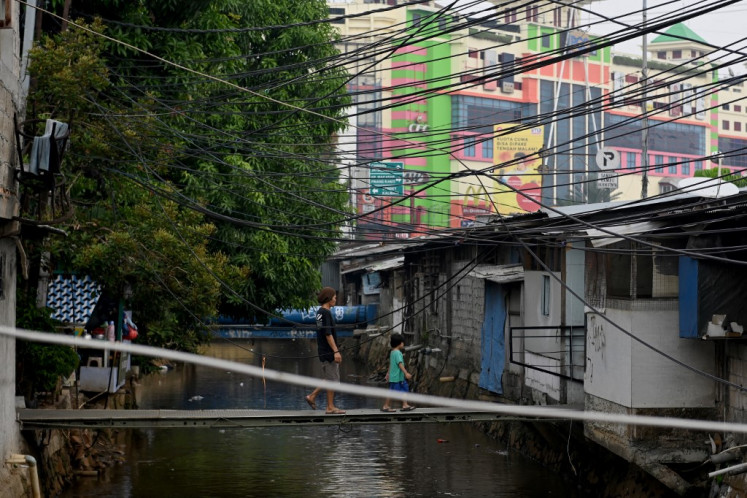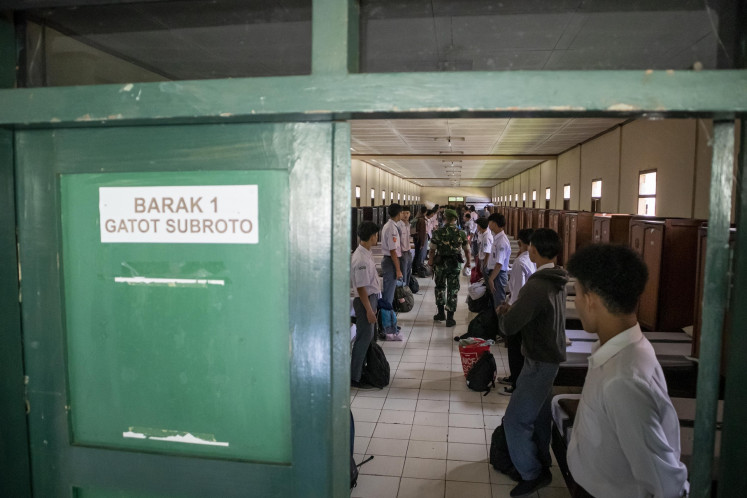Govt, association to develop downstream seaweed industry
The government and the Indonesian Seaweed Association (ARLI) are collaborating to develop downstream seaweed industries to create more added value from this marine commodity and to create job opportunities
Change text size
Gift Premium Articles
to Anyone

T
he government and the Indonesian Seaweed Association (ARLI) are collaborating to develop downstream seaweed industries to create more added value from this marine commodity and to create job opportunities.
The measures were being taken to maximize the potential from increasing seaweed production in Indonesia, Maritime Affairs and Fisheries Minister Sharif Cicip Sutardjo said on Monday at the opening of the International Seaweed Symposium in Nusa Dua, Bali.
'This program will create more added value by processing seaweed into various intermediary and end products, so we can export not only the raw material, but also the products.'
The minister claimed that the development of downstream seaweed industries had attracted Rp 165 billion (US$17 million) in investment from four companies this year, as well as creating jobs for over 600 people.
'Developing the seaweed industry would not only increase state revenue, but also create a lot of job opportunities,' he said, adding that it also helped to fulfill supply for the domestic market, as well as increasing export levels of seaweed products. Seaweed can be processed into more than 500 food and non-food products.
The ministry has targeted national seaweed production of 7.5 million tons this year, rising by 30 percent from last year's 5.2 million tons. For 2014, the ministry aims to produce 10 million tons .
As for seaweed products, the ministry is targeting 205,000 tons this year, in the form of Alkali Treated Carrageenan (ATC), Semi Refined Carrageenan (SRC), Refined Carrageenan (RC), jelly, alginates, and other formulated products.
Indonesia has the potential to cultivate seaweed on 1.1 million hectares. The country's biodiversity of seaweed species is vast, amounting to more than 555 species, 45 percent of all seaweed species worldwide, including Glacilaria, Gelidium, Eucheuma, Hypnea, Sargassum and Turbinaria.
'The benefit of cultivating seaweed is that it can be harvested in only 45 days and can be planted at any time, in any weather, all through the year,' the minister said, adding that the government called for a greater contribution from scientists and researchers to develop this commodity.
Safari Azis, chairman of ARLI, said that in addition to developing seaweed processing industries, the association also called for an increase in the use of seaweed as an ingredient for various local industries to replace chemicals.
'Seaweed can be a natural emulsifier, thickener and coagulant to replace chemicals and animal fats. We expect more industries to use it,' he said, adding that the association was also campaigning for an increase in seaweed consumption.
Currently, from the over 555 species of seaweed grown in Indonesia, only three species are cultivated: Euchema cottonii, Euchema spinosum and Gracilaria sp. Most of the cultivation areas are in eastern Indonesia, including Bali, Sulawesi and Maluku.
'Therefore, there is still much untapped potential for seaweed in Indonesia, both in the field of cultivation and processing,' he said.
Meanwhile, the association has targeted increasing exports from 169,000 tons last year to 180,000 tons this year. Competing with Philippines and Thailand in the global seaweed market, the country is still struggling with high transportation costs for the commodity. The association expects the government to provide more incentives.









